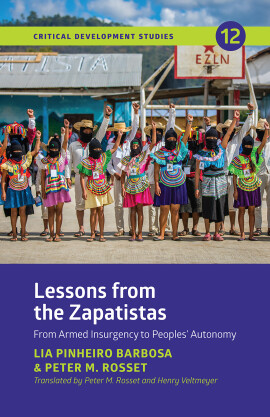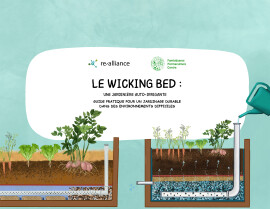
Peasants
Chayanov's recovered essays
Teodor Shanin, Alexander Nikulin, Irina Trotsuk, Jan Douwe van der Ploeg
This book represents two great genres of world literature – a kind of propaedeutic ‘ABC of Cooperation’ and a kind of ‘Cooperative Manifesto’. In these insightful works, written and published a hundred years ago, Chayanov presents a fascinating vision of the struggle of the Russian, and international, cooperative movement for a new, just, social world.
Chayanov repeatedly mentioned that peasant cooperation had to constantly overcome the element of the capitalist market and the element of state bureaucracy. He argued that the free, vertical cooperation of autonomous economies ‘from below’ was more socially and economically efficient than the horizontal, bureaucratic collectivization ‘from above’. Chayanov considered the world (national) economy not as a single whole, like in the classical, political economy, but as a conglomerate of various economic forms based on different organizational principles.
However, he recognized that in the 19th and 20th centuries, capitalism played a leading role in the development of the world economy despite its serious flaws. Chayanov considered the peasant family-cooperative and socialist movements to be the two most important anti-capitalist phenomena.
Chayanov's explanation of the necessity of a model of diverse and parallel economies is consistent with the contemporary desire to organize an effective and fair social life ‘from below’ (through the initiatives of individuals, families, and communities) with the solidarity of cooperatives and local, public organizations that contribute to the further expansion of the cultural diversity of large and small social worlds. The works of Chayanov, which have never been published in English before now, present many valuable answers and practical recommendations for the contemporary agricultural consulting and rural development activists.
Series: Agrarian Change & Peasant Studies
Published: 2024
Pages: 296
eBook: 9781788532518
Paperback: 9781788532495
Hardback: 9781788532501
Chayanov repeatedly mentioned that peasant cooperation had to constantly overcome the element of the capitalist market and the element of state bureaucracy. He argued that the free, vertical cooperation of autonomous economies ‘from below’ was more socially and economically efficient than the horizontal, bureaucratic collectivization ‘from above’. Chayanov considered the world (national) economy not as a single whole, like in the classical, political economy, but as a conglomerate of various economic forms based on different organizational principles.
However, he recognized that in the 19th and 20th centuries, capitalism played a leading role in the development of the world economy despite its serious flaws. Chayanov considered the peasant family-cooperative and socialist movements to be the two most important anti-capitalist phenomena.
Chayanov's explanation of the necessity of a model of diverse and parallel economies is consistent with the contemporary desire to organize an effective and fair social life ‘from below’ (through the initiatives of individuals, families, and communities) with the solidarity of cooperatives and local, public organizations that contribute to the further expansion of the cultural diversity of large and small social worlds. The works of Chayanov, which have never been published in English before now, present many valuable answers and practical recommendations for the contemporary agricultural consulting and rural development activists.
| Series Editor’s Foreword | |||
|---|---|---|---|
| Preface: Chayanov’s worlds | |||
| 1. Chayanov A.V. On the Agrarian Question | |||
| Introduction | |||
| Formulation of the agrarian question | |||
| “Land to the working people!” | |||
| What we should do with forests and special types of economy? | |||
| Land question or agrarian question? | |||
| Forms of land socialization | |||
| Land reform | |||
| Conclusion | |||
| 2. Chayanov A. Main Ideas and Methods of Social Agronomy | |||
| Foreword | |||
| Chapter 1. The tasks of social-agronomic work | |||
| Chapter 2. Methods of the social-agronomic work | |||
| Chapter 3. The program of social-agronomic work | |||
| Chapter 4. Developing an agronomic program | |||
| Chapter 5. Agronomic organization | |||
| Chapter 6. Methods of oral, social-agronomic propaganda | |||
| Chapter 7. Conversations, lectures, courses, and agronomic consulting | |||
| Chapter 8. Agricultural exhibitions, demonstration events, model farms, and peasant excursions | |||
| Chapter 9. The agricultural warehouse, rental points, and grain-cleaning stations | |||
| Chapter 10. Organizational work of the agronomist | |||
| Chapter 11. Social agronomy and cooperation | |||
| Chapter 12. The equipment of the agronomic station | |||
| Chapter 13. Registration and evaluation of social-agronomic work | |||
| 3. Chayanov A.V. A Short Course on Cooperation | |||
| Chapter 1. What is cooperation? | |||
| Chapter 2. A history of the cooperative movement | |||
| Chapter 3. The rural consumer community | |||
| Chapter 4. Agricultural and credit partnerships | |||
| Chapter 5. Cooperative sales of agricultural products | |||
| Chapter 6. Dairy artels and other animal husbandry cooperatives | |||
| Chapter 7. Conclusion | |||
| 4. Chayanov A.V. On differentiation of the peasant economy | |||
| 5. Letter from A.V. Chayanov to V.M. Molotov on the current state of agriculture in the USSR compared with its pre-war state and the situation in agriculture of capitalist countries (October 6, 1927) | |||
| Basic types of world economies before the war | |||
| Contemporary trends in American agriculture | |||
| The current state of agriculture in the USSR | |||
| Challenges for the evolution of agriculture in the USSR | |||
| Selected works of Chayanov and about Chayanov in English |
'Peasants: Chayanov’s recovered essays is packed full with ample evidence that the past is critical to informing the present. This is a book about what peasants are, what they do, how they do it, the role they play in society, and why all of this matters – a lot. The essays, written a century ago, portrayed struggles which are ongoing. The challenges Chayanov described certainly continue but peasants around the world have refused to be disappeared. Bravo Teodor, Alexander, Irina and Jan Douwe for reminding us – in numerous and nuanced ways – all of the power and wisdom that can be garnered by looking carefully at history as we collectively envision and work towards a world with more, not fewer peasant communities.'
Annette Aurélie Desmarais, former Canada Research Chair in Human Rights, Social Justice and Food Sovereignty (2013-2023), University of Manitoba
'These ‘lost’ essays by Chayanov are a joy to read. They enlighten and enrich the roots of a tradition that still has a lot to impart. They grapple with the central questions of ‘modernization’: what elements of the past can help build a flourishing future? And what needs to be done to ensure such a future? Chayanov’s answers aren't always as Chayanovian as one might think! But they are always based on a wealth of empirical data, and the ‘peasant economy’ continues to have a major role to play in his vision of the sane society.'
Julien-François Gerber, International Institute of Social Studies, The Hague
‘It is an amazing fortune that this book has finally come to light. If this work had been published at the time the essays were written by Chayanov (1920s), it is likely that the course of the contemporary history of agronomy, cooperativism, the agrarian question and rural development would have been different. I can only say to all interested in rural, food and agrarian issues that this book must be on your shelf. This book needs to be incorporated into the lexicon of those that struggle for a more sustainable agriculture in the 21st century.’
Sergio Schneider, Professor of Sociology of Rural Development and Food Studies at the Federal University of Rio Grande do Sul (UFRGS), Porto Alegre, Brazil
'This book will unveil A.V. Chayanov to any kind of reader. Those who get to read Chayanov for the first time will get a good insight into Chayanov's thoughts and will find into one piece a broad overview of his work. These include the agrarian question, processes of differentiation, the role of cooperation or a description of social agronomy. Those who are familiar with Chayanov’s work will find unpublished writings and letters. All, will be delighted to read how up-to-date is his work, particularly for those working in the construction of food systems based on agroecology. I fully recommend this book not only to those interested in critical agrarian studies but also to agronomists who really want to understand how relevant the profession is and why they need to work with and for people. In Chayanov’s words: Like any social work, social agronomy relies on people and can influence agriculture only through people.'
Marta Rivera, Research Professor, Spanish National Research Council (CSIC)






